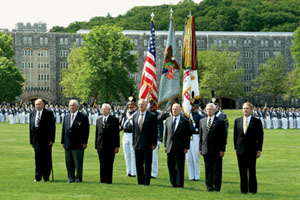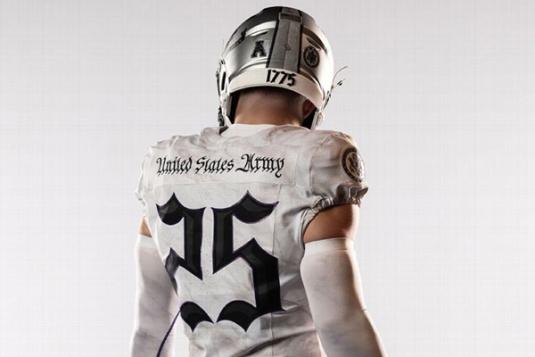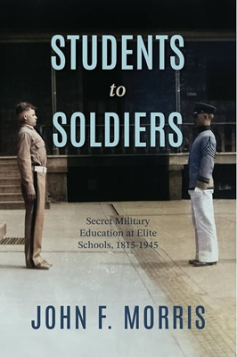The West Point Association of Graduates (WPAOG) has named the 2006 recipients of the Distinguished Graduate Award. This annual award has been bestowed upon those West Point graduates whose character, distinguished service, and stature draw wholesome comparison to the qualities for which West Point strives, in keeping with its motto: “Duty, Honor, Country.” View photos here. The 2006 Distinguished Graduate Award Recipients are:
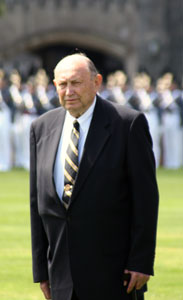
LTG (R) Richard G Trefry ’50
Lieutenant General Richard Greenleaf Trefry, Class of 1950, began his military career as an enlisted soldier during World War II before coming to the Academy; after graduation he served as a young Artillery officer in Germany, commanded an Artillery battalion in combat in Vietnam, added distinguished service in Laos, made major contributions in the Army personnel and management arena, and retired after six significant years as the Inspector General of the Army. He then continued his service to his country in a civilian capacity as a Senior Fellow of the Institute for Land Warfare, Military Assistant to the President of the United States during Operation Desert Shield/Desert Storm, and Program Manager for the Army Force Management System.
Read More
As an artillery battalion commander at Ft. Sill, Oklahoma, in 1966, he was tasked to form a unit from Army-wide acquisitions, train for twelve weeks, and then deploy to Vietnam to support U.S. Marine Corps units at the Demilitarized Zone. In this unusual joint role, he led his unit wisely, met immense daily challenges, and saw his men awarded the Navy Presidential Unit Citation for their efforts.
In 1973, while concurrently commanding the Joint United States Military Assistance Advisory Group to Laos, and Defense Attaché to Laos, he contributed substantially to the defeat of a coup d’etat by Laotian Air Force officers in exile in Thailand against the Royal Lao government recognized by the United States.
He performed an essential service for West Point and the Nation during a dark time in 1976, when Congress seriously considered and narrowly defeated a measure that would have abolished the honor systems of all the service academies. From his position as the Assistant Deputy Chief of Staff for Personnel during the cheating scandal, he strongly supported the report of the Borman Commission and ensured that the suggested recommendations for change were supported by the Army leadership. The success of the implementation of The Hoffman Plan was a direct result of his commitment and dedication to Duty, Honor, and Country.
In 1977-1983, during his capstone military assignment as The Army Inspector General, he revolutionized the Army’s approach to the Annual Inspector General Inspection by transforming it from a compliance event into an inspection that identified and corrected systemic failings that inevitably led to recurring deficiencies and interfered with the ability of unit commanders to accomplish their missions. In essence, he perceived that the Army was expending considerable time and manpower to inspect all units annually but was missing opportunities to make significant management improvements that could save time, money, and lives. By encouraging openness and a commitment to identifying problems and fixing them at the appropriate level, he had a profound positive effect on the readiness of the Army and the morale of its soldiers and subordinate leaders. His impact was felt especially in the area of nuclear technical proficiency inspections where the goal of the inspection shifted from affixing micro blame to correcting macro processes. He accomplished all this by spending a great deal of time in the field, speaking with those who were the end users of the vehicles, weapons, ammunition, and other materiel of the Army and who would be tasked to employ them in the event of armed conflict.
In 1990-1992, as Military Assistant to the President of the United States, he directed the White House Military Office during Operation Desert Shield/Desert Storm, serving as a military advisor to President Bush during those trying but ultimately victorious times.
In his capstone civilian assignment, as the founder and Program Manager of the Army Force Management School in 1995, he ensured that the Army always would have trained military and civilian personnel, well versed in the intricacies of complex force management issues and capable of making decisions and formulating policies to provide the quantity and quality of Army forces and materiel needed to meet the growing challenges facing the United States. More than 14,500 Army personnel have been trained in combat developments and management to meet these challenges at the school that he founded and managed, and their contribution has been substantial in the rapid transformation that the Army has undertaken in the past few years.
Lieutenant General Richard G. Trefry has devoted his entire life, from his beginnings as an enlisted soldier in World War II, through his years as a respected Tactical Officer at West Point through his time at the highest military and civilian levels in Washington to making the Army better. It has been said that no one had his depth of comprehensive knowledge of how all of the policies, processes, realities and imperatives of the Army worked together, no one was more capable of explaining how it could be improved, and no one has done more to contribute to its continued improvement for a more extended period of time.
Accordingly, the Association of Graduates of the United States Military Academy takes great pride in presenting the 2006 Distinguished Graduate Award to Richard Greenleaf Trefry.
Mr. Herbert S. Lichtenberg ’55

As an extraordinarily successful businessman and philanthropist, particularly to the United States Military Academy, Herbert S. Lichtenberg has exemplified outstanding devotion to the principles expressed in the motto of the United States Military Academy: Duty, Honor, Country.
Read More
A 1955 graduate of the United States Military Academy, Herbert Lichtenberg served as a lieutenant for three years in the United States Air Force. In 1958, upon completion of his service obligation, Herb joined his father’s firm, S. Lichtenberg and Sons, in New York City. He quickly demonstrated a strong aptitude for sales and personnel management within the curtain and drapery segment of the home fashions industry. Further, he gained a strong reputation as a highly ethical, principled business man whose dealings reflected a strong moral code. In 1980, he became President of S. Lichtenberg and Sons. In 1988, within the home furnishing industry, Mr. Lichtenberg was awarded the highest honor which can be bestowed by the Home Fashion Products Association, the “Marvin Rosenberg Humanitarian Award.” That same year, he was designated “Curtain and Drapery Citizen of Industry.” Eleven years later, in 1999, he was named “Dean of the Industry” at the industry’s annual show.
Herbert Lichtenberg’s renowned philanthropy to West Point has been accomplished with several unique characteristics: he contributes quietly, often behind the scenes, without fanfare; he focuses on projects which the Academy would otherwise be unable to accomplish for itself; he has an ability to negotiate, encourage and motivate the involvement and giving of others with charitable resources; and the projects which he supports with his immense energy and financial resources clearly reflect his great love of West Point and particularly, the Corps of Cadets. Mr. Lichtenberg’s contributions to West Point have been and continue to be truly significant. They extend across a wide range of activities but can be categorized into three broad areas: support of religious programs and activities; support of Army athletic teams and programs; and support of West Point’s quality of life.
His support of religious programs and activities at West Point began in 1965 when he joined a group dedicated to erecting a West Point Jewish Cadet Chapel. Through his organizational skills, energetic fund-raising and unselfish generosity, the Jewish Chapel was completed and consecrated in 1984. This chapel established for the first time a distinctly visible Jewish presence at the Academy. This presence was required if only for the purpose of acknowledging the thousands of Jewish soldiers who have served and died in the United States Army since this country was founded. Mr. Lichtenberg, along with a number of others, also contributed funds and management expertise for religious support projects of great value to the Military Academy. These include construction of a “Founders Garden” located adjacent to the Jewish Chapel; renovation of Building 147 to serve as a Cadet Interfaith Religious Center; floor repairs and construction of a handicapped ramp for Most Holy Trinity Chapel; installation of a new sound system in the Cadet Chapel; purchase and installation of a pipe organ in the Old Cadet Chapel; design of an air conditioning system for Most Holy Trinity Chapel; and renovation of windows, floors and pews in the Old Cadet Chapel.
Since his return to New York City in 1958, Herbert Lichtenberg has closely followed Army Athletics. In the late 1990s, he responded to a Superintendent’s wish to have an indoor tennis facility built as part of the Bicentennial Campaign. Mr. Lichtenberg and the Class of 1955 jointly funded the Lichtenberg Tennis Center. The tennis center served as the Class of 1955s 50th reunion gift to the Academy. This building was significant in a number of respects. First, it was the first firm, significant commitment by a living graduate to build a facility during the Bicentennial Campaign, and it served to prompt a number of other major contributions during the Bicentennial Campaign; and second, this tennis center was of such superb functional and architectural design that it was designated by the United States Tennis Association to receive the USTA “Outstanding Tennis Facility Award” in 1999. At about this time, Mr. Lichtenberg learned of the need to construct a dedicated gymnastics facility. In turn, Mr. Lichtenberg and his good friend, Lou Gross, combined their energy and resources to fund and construct the Gross Sports Facility that was opened in 2001. Later, Mr. Lichtenberg learned of the pressing need for new housing to attract and retain quality athletic coaches of the major Army sports teams. In coordination with the Superintendent and the Director of Intercollegiate Athletics, an idea was conceived to build six sets of new quarters for coaches. Again, Mr. Lichtenberg assumed the lead with funding. Further, he played a central role in encouraging others to become major donors to this athletic coaches’ housing project. The success of the prompt construction of the first three sets of new quarters led to the decision to expand the original project of six with an addition of three more sets of coaches’ quarters, bringing the total to nine. Lastly, Mr. Lichtenberg purchased and donated a custom-designed, new motorcycle from Orange County [New York] Choppers for use by the spirit team at rallies and football games.
The third important aspect of his philanthropic support was to the West Point Community’s quality of life. In support of the Foreign Language Department, he helped to fund Cadet educational trips to the People’s Republic of China. Additionally, for the Office of the Dean, he has helped support cadet travel in support of academic programs to include such places as the Holocaust Museum in Washington, DC. He has also donated three large television sets to the 1st of the First Infantry Battalion mess hall to provide entertainment for this 24-hour, 7-day-a-week operation in support of the enlisted soldiers of the battalion. Further, he has been generous to the Most Holy Trinity Christmas Fund and the Post Sergeant Major’s Basket Program helping needy soldiers and their families. Last, Mr. Lichtenberg is credited with the idea of having the “old grad” march back associated with the Plebe hike from Lake Frederick to West Point that commenced in 2000. This program has allowed for hundreds of West Point graduates to bond with today’s cadets. Consequently, early in the cadet West Point four-year experience, cadets get a sense of the significance of their joining the “Long Gray Line.”
Accordingly, the Association of Graduates of the United States Military Academy takes great pride in presenting the 2006 Distinguished Graduate Award to Herbert S. Lichtenberg.
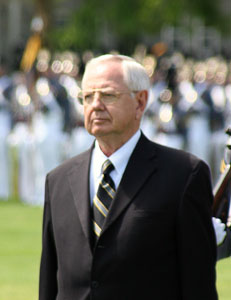
Mr. Arthur E. Dewey ’56
A distinguished soldier and aviator whose twenty-five years of military service included two combat tours in Southeast Asia, a humanitarian whose unremitting efforts on behalf of refugees and other victims of man-made disasters brought hope and saved countless lives throughout the world, and an Assistant Secretary of State who shaped and influenced policy decisions at the highest levels during some of the Nation’s most difficult hours, Gene Dewey has served with a lifelong commitment to the ideals expressed in the West Point motto: Duty, Honor, Country.
Read More
He graduated from West Point in 1956, was commissioned in the Corps of Engineers, and subsequently received his wings as an Army Aviator. His initial troop assignment was with a Combat Engineer Battalion in Germany where he served as battalion aviator and later as an engineer company commander. A master’s degree from Princeton followed, then participation in the first-ever self-deployment of an Army Aviation unit to an overseas destination in the movement of the 1st Aviation Company (Caribou) from Ft. Benning to Southeast Asia. The unit responded initially to a contingency in Thailand, then transferred to Vietnam in 1963 where Captain Dewey flew the Caribou into virtually all of the short, unimproved strips in that country in support of the U.S. advisory effort. During this tour, he flew over 1000 combat hours, and his unit was among the first to receive enemy fire in the Vietnam War.
Command of an engineer company at Fort Stewart and attendance at the Command and General Staff College were followed by a Pentagon tour in the Office, Chief of Research and Development. There Captain Dewey was promoted to Major and subsequently became Aide-de-Camp to the Commanding General, Army Materiel Command. This extraordinary association with the Army’s top manager and problem-solver shaped Gene Dewey’s response to all of the military and civilian challenges that followed.
In 1968 he was selected as a White House Fellow and served as an Assistant to the Administrator of the Agency for International Development. During the Fellowship year, he significantly improved the effectiveness of the civilian relief effort to the victims of the Nigerian Civil War. He developed a major U.S. humanitarian initiative—the Cross River proposal—to deliver relief supplies into the surrounded Biafran enclave. He played a central role in the shuttle diplomacy seeking agreement to the proposal, and on the final day of his White House Fellowship, presided over the last meeting of the belligerents before the war ended.
He went back to the Vietnam War in 1970 and commanded the 222nd Combat Aviation Battalion—a composite unit of 500 men and 72 helicopters. During his command tour, his battalion gained the reputation as one of the Army’s most combat-effective units. He was awarded the Distinguished Flying Cross for his overall command of the helicopter gun ships in a three nation combined prisoner rescue operation in Cambodia.
Lieutenant Colonel Dewey returned to Washington in 1971 to become director of the Nation’s senior leadership development program—the President’s Commission on White House Fellowships. He was selected for the Army War College in 1972, with assignment as an Army Research Associate at the Graduate Institute for International Studies in Geneva, Switzerland. His second Pentagon assignment was in the Office of the Deputy Chief of Staff for Military Operations as Chief of the Political-Military Division; in 1975 he was designated a Senior Military Fellow at the Council on Foreign Relations; a year later, he became commanding officer of the U.S. Military Community in Heilbronn, Germany. This assignment was followed by selection as Defense Planner in the U.S. Mission to NATO. Colonel Dewey was back in the Pentagon for his final three years of military duty, where he served as Executive Officer to the Assistant Secretary of Defense, International Security Affairs. There he contributed significantly to the successful Theater Nuclear Force Program for Western Europe. In 1981, he accepted a civilian appointment from President Reagan as Deputy Assistant Secretary of State, Bureau of Refugee Programs.
The Reagan era represented the Nation’s golden age in getting productivity out of United Nations agencies on behalf of emergency victims worldwide, and for getting unprecedented financial burden sharing on behalf of the American taxpayer. Gene Dewey was a major player in all of these operations during the “Refugee Decade” of the 1980s. Responding to the horrific effects of war and famine in Africa in 1984, he succeeded in getting UN Secretary General Perez de Cuellar to create the UN Organization for Emergency Operations in Africa. This operation is known to this day as the finest hour of the United Nations, and it also served as a classic model for constructive United States/United Nations cooperation.
Early in 1986 Perez de Cuellar appointed Gene Dewey an Assistant Secretary General with assignment as UN Deputy High Commissioner for Refugees in Geneva, Switzerland.
In 1991 Secretary of State Eagleburger asked Gene Dewey to head the newly created Office of Emergency Humanitarian Assistance for the former Soviet Union. His leadership and personal interventions were critical in U.S. efforts to bring stability and rehabilitation to the successor states of the USSR.
Beginning in 1993, he served for four years as director of an NGO—the Congressional Hunger Center. He led the Center in energizing a U.S. Government relief and water supply effort that saved tens of thousands of the one million refugees that fled from Rwanda to Goma, Zaire in July 1994. After the Congressional Hunger Center, he accepted a position as Professor in Residence at the Army Peacekeeping Institute at Carlisle Barracks, Pennsylvania.
The culmination of a lifetime of service to his country came in January 2002 when President Bush appointed him Assistant Secretary of State for Population, Refugees, and Migration. By the time of his retirement in June 2005, Gene Dewey had helped shape the return of over four million refugees to Afghanistan. To sustain this unprecedented homecoming, he took a page from President Roosevelt’s Civilian Conservation Corps in the 1930s depression and gained President Karzai’s support for an Afghan Conservation Corps that continues to provide jobs and hope for returnees and other needy Afghans. Secretary of State Colin Powell also assigned Gene Dewey a key role in facilitating the transition in Afghanistan from a Coalition military operation to an indigenous political authority. To close a long chapter of his own involvement in Southeast Asia, he negotiated with the Government of Vietnam the re-opening of the Orderly Departure Program for those Vietnamese penalized for their association with the United States who had not previously been able to avail themselves of the program. He worked tirelessly with senior Vietnamese officials to stop the persecution that still causes Highland tribes people to flee their country.
In the fifty years since his graduation from the Military Academy, Gene Dewey has used extraordinary opportunities for public service to model the core values of West Point in a long series of remarkable contributions, not only to his country, but equally important, to all of humanity.
Accordingly, the Association of Graduates of the United States Military Academy takes great pride in presenting the 2006 Distinguished Graduate Award to Arthur Eugene Dewey.
MG (R) Nicholas S. Krawciw ’59
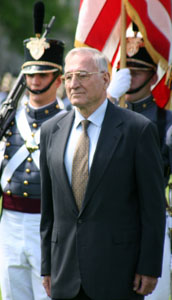
A distinguished soldier whose tactical innovations and leadership techniques have been widely adopted by the United States Army from the Fulda Gap to the jungles and rice paddies of Vietnam; a respected advisor on national security policy in Eastern Europe; Nicholas S. Krawciw has served his country with integrity, distinction, and an unparalleled sense of duty over a career spanning five decades.
Read More
Born in the Ukraine, he moved with his family to Germany at the start of World War II. In 1949, the family emigrated to the United States.
Nick Krawciw entered the Military Academy in 1955 where he played varsity soccer and became a cadet regimental commander, graduating with the Class of 1959. One of the first members of his class to go to Vietnam, he was severely wounded in an ambush. After recuperating, Captain Krawciw commanded a cavalry troop at Fort Hood where he co-invented an advanced armor system for ground vehicles, a composite system similar to that later incorporated into tank design. For a troop commander to be involved in armor research was unusual, and a portent of his future career.
Following a tour in the Tactical Department at West Point, Major Krawciw returned to Vietnam as S-3 of the 3rd Squadron, 5th Cavalry. During a year of intense fighting along the DMZ, Nick was awarded three Silver Stars and was instrumental in devising new tactics and countermeasures that frustrated a tenacious enemy.
Major Krawciw was sent to Israel in 1972 as the Chief Operations Officer for the UN Truce Supervision Organization. Promoted to Lieutenant Colonel, he produced intelligence reports prior to the start of the Yom Kippur War that led to a personal commendation from the Chief of Staff of the Army, General Abrams.
Nick commanded the 1st Squadron, 2nd Armored Cavalry Regiment in 1974, and later served at Headquarters, U.S. Army, Europe. Following a year as a Fellow at the Hoover Institution at Stanford, Colonel Krawciw was assigned to the Training and Doctrine Command as Director of Concepts and Doctrine in combat development. Here, his seminal work on maneuver doctrine revolutionized the way the Army fought, was organized, and was trained. Nick Krawciw’s ideas were largely responsible for victories in Panama, Desert Storm, Iraqi Freedom, and many important but smaller contingencies.
In 1979, Colonel Krawciw returned to Germany to command the First Brigade of the 3rd Armored Division. Back home after two years in command, Nick was nominated by the Army Chief of Staff to attend the Senior Seminar of the Department of State. In 1982, he was assigned to the Army staff and then as Military Assistant to the Deputy Secretary of Defense. Promoted to Brigadier General, he returned to Germany in 1984 as Assistant Division Commander of the 3rd Infantry Division and then Executive Officer to the Supreme Allied Commander, Europe. In 1987, Major General Krawciw assumed command of the 3rd Infantry Division. His final active duty assignment was Director of NATO Policy in the Office of the Secretary of Defense in 1989-1990. That same year, personal health problems necessitated his retirement from the Army.
Since he spoke Ukrainian fluently, Nick Krawciw was urged by the Department of Defense to become involved in assisting the newly independent Ukraine to establish political freedom and a marketplace economy. With the approval of our government, General Krawciw met with Ukrainian officials and agreed to help them set up a non-profit, non-governmental political science institute. At the behest of the Chief of Staff of the U.S. Army and the Undersecretary of Defense, Nick and his dedicated wife Christina moved to the Ukraine in 1992 where, for a year, he worked to reorganize, educate, and restructure the Ukrainian military on Western lines. Beginning in 1993, as a consultant to the Secretary of Defense on Ukrainian matters, and later as Secretary of Defense Senior Military Representative to the Ukraine, General Krawciw was largely responsible for converting the Ukrainian Armed Forces from a communist army that was feared throughout Europe to one that now has democratic standards.
The country had not governed itself in 300 years, so there was no body of law, no democratic tradition, and a military organized on the totalitarian model with corresponding values. Nick assisted in professional development, including ethics, guided reduction of forces to appropriate levels, and identified sound leaders. Progress was slow and difficult, but ultimately effective.
The culmination of his efforts was the refusal of the Ukrainian Army to disperse the orange revolution demonstration that ultimately overturned the fraudulent election of 2004, thus justifying the years of dedicated effort General Krawciw and other American officers had spent to achieve a democratic Army in the Ukraine.
Nick Krawciw was instrumental in establishing educational exchange programs with the Ukrainian military, devoting many hours to sponsoring and escorting both military and civilian groups from the Ukraine around the United States. In recognition of his signal accomplishments, the Ukrainian Congress Committee of America awarded him the Shevchenko Freedom Award in 2004.
In 1995, in addition to his work with Ukraine, Nick Krawciw began 10 years service as President of The Dupuy Institute; and is now Chairman of the Board. Under Nick’s leadership, the Institute, dedicated to scholarly analysis of military historical trends, blossomed.
Throughout a lifetime of distinguished service, Nick Krawciw’s career has been marked by inspirational leadership and steadfast dedication to the ideals expressed in the West Point motto: “Duty, Honor, Country.” His extraordinary accomplishments in the international arena have made a lasting and invaluable contribution to the national security of the United States.
Accordingly, the Association of Graduates of the United States Military Academy takes great pride in presenting the 2006 Distinguished Graduate Award to Nicholas Stephen Krawciw.
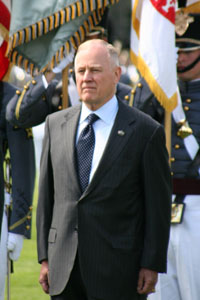
GEN (R) Wayne A. Downing ’62
General Wayne A. Downing, a member of the Class of 1962, has brought extraordinary credit to the United States Military Academy through his lifetime of uniquely distinguished service to the Nation. As a combat leader, educator, global strategist, and national security expert, Wayne Downing’s critical contributions to national defense and security have immeasurably raised the prominence of West Point as an institution vital to the American way of life.
Read More
Wayne Downing served the Nation in critical roles during three decades of our Nation’s wars. Upon commissioning into the Infantry, he embarked on a thirty-four-year military career, rising to the rank of four-star general and the position of commander of all United States Special Operations forces. His reputation was that of a smart, decisive, forceful, and caring leader, known in particular for his unwavering determination to accomplish any mission assigned and provide his soldiers the best possible support. Since retiring from the Army in 1996, General Downing has repeatedly answered the call of public service. He is one of our Nation’s foremost advisors and experts on fighting the war on global terrorism. General Downing’s career has epitomized the phrase “lifetime of service to the Nation” and exemplified ideals inherent in Duty, Honor, Country.
Granted a competitive appointment to the United States Military Academy as the Son of a Deceased War Veteran (WW II) from the State of Illinois, Wayne Downing’s early military career included assignments on Okinawa and in the Republic of Vietnam with the 173d Airborne Brigade, followed by instructor duties at the Infantry School and company-level command in the 1st Training Brigade at the United States Army Infantry Training Center, Fort Benning, Georgia, in 1968. He then returned to Vietnam to command Company A, 2d Battalion, 14th Infantry Regiment, 25th Infantry Division, followed by duties as the Battalion and then the 2d Brigade Operations Officer.
Following graduate school at Tulane University, Wayne Downing served as a senior operations research/systems analyst in the Office of the Secretary of Defense. Then a major, he served successively as operations officer and then executive officer of the 1st Battalion (Ranger), 75th Infantry, Fort Stewart, Georgia, in 1975 and 1976. A series of commands followed: he commanded Task Force (Alaska), 24th Infantry Division from 1976 to 1977 and the 2d Battalion (Ranger), 75th Infantry Division from 1977 to 1979. Following completion of the Air War College and a tour as secretary to the Joint Staff, United States European Command, Vaihingen, Germany, he commanded the 3d Brigade, 1st Armored Division in Germany. His culminating field grade command was activation and command of the 75th Infantry Regiment from 1984 to 1985. There, he also oversaw the activation of a third Ranger Battalion and guided its integration into the newly formed regiment, which also included the 1st and 2d Ranger battalions, previously independently operating units.
Promoted to brigadier general in 1985, Wayne Downing advanced to the forefront in the special operations community. In November 1989 he was appointed commanding general of Joint Special Operations Command, U.S. Special Operations Command, based at Fort Bragg, North Carolina. In December of that year he commanded the joint special operations forces that were so successful during the swift liberation of Panama during Operation Just Cause. One year later, during Operation Desert Storm, General Downing commanded a joint task force of 1200 American special operations forces who conducted highly effective attacks on the Iraqi SCUD missile infrastructure. Deep behind enemy lines, the direct action of special operations forces led to the end of the SCUD attacks on Israel and dramatically reduced the overall ballistic missile threat in the theater of operations. These operations directed by General Downing were largely responsible for thwarting the Iraqi regime’s attempt to use attacks on Israel to break up the allied coalition. In August 1991, he was appointed commanding general of the United States Army Special Operations Command. In 1993, he was appointed Commander-in-Chief of the United States Special Operations Command. In this capacity he trained, equipped, and deployed 47,000 special operators from the Army, Navy, and Air Force in worldwide deployments in support of U.S. foreign policy objectives and the Global Combatant Commanders. He retired from active duty in 1996, highly decorated by his Nation and many of its allies. His retirement from public service was short-lived, however, as global terrorism became increasingly active. Following the deadly attack on Khobar Towers in June, Wayne Downing led a 40-person presidential task force that investigated the attack and made recommendations on how to better protect Americans abroad. Three years later, he was appointed by the U.S. Congress to the National Commission on Terrorism, which advocated implementing an aggressive global strategy to combat the rising, undeclared war of terrorism against the United States. The national emergency that began on September 11, 2001, drew him from retirement yet again; he accepted appointment by the President as the National Director and Deputy National Security Advisor for Combating Terrorism. In this position his responsibilities involved coordinating the diplomatic, law enforcement, intelligence, financial, and military facets of the global war on terrorism.
In recent years, General Downing has often returned to West Point, where he has served since 2003 as the Distinguished Chair of the Combating Terrorism Center. At West Point, he has helped to develop the next generation of the Long Gray Line, providing an extraordinary mentor and role model for the Corps of Cadets. He also serves as a visiting faculty member at the University of Michigan Ross Business School, where he conducts seminars on leadership and transformation management.
Accordingly, the Association of Graduates of the United States Military Academy takes great pride in presenting the 2006 Distinguished Graduate Award to Wayne A. Downing.
BG (R) Howard T. Prince, II ’62
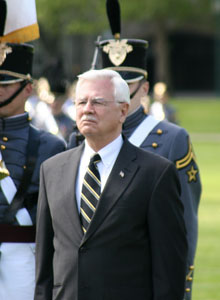
For more than thirty years of selfless service to the Nation, Brigadier General Howard T. Prince II has been at the forefront of leadership studies and leadership education. His groundbreaking work is a signal achievement that truly exemplifies the West Point motto, “Duty, Honor, Country.”
Read More
Howard Prince’s remarkable active duty military career spanned twenty-eight years beginning in 1962 when he graduated in the top five percent of his class as a Distinguished Cadet and was commissioned as a Second Lieutenant of Infantry. His initial assignment was to the 1st Airborne Battle Group, 187th Infantry, 82nd Airborne Division at Fort Bragg, NC, where he served as an infantry platoon leader, scout platoon leader, company executive officer, aide-de-camp, and staff officer in the division G3 section. His troop-leading skills emerged early in 1963 when his scout platoon outperformed all other infantry scout platoons and the scout platoons of the division’s 17th Cavalry to win the Beach Trophy as best scout platoon in the division. In 1965, he was selected for the Olmsted Scholar Program and completed studies at the University of Bonn in Germany. Following those studies, he was assigned to the 1st Cavalry Division in Vietnam where he was twice wounded during intense combat. The first time was in October 1967, while serving as a battalion staff officer. Following his recovery from the wounds he incurred at LZ COLT, he returned to his unit where he was soon assigned to command B Company, 5th Battalion, 7th Cavalry of the First Cavalry Division. During the Tet Offensive of early 1968, his unit was heavily engaged during the fight to recapture Hue City and relieve the pressure on the Marines fighting in and around its Citadel. While leading his company in an attack against a heavily fortified enemy position that controlled the main avenue of approach into Hue, he was wounded again. These life-threatening wounds required a medical evacuation to the United States where he was hospitalized for almost a year. For his gallantry in combat, he was awarded the Silver Star, the Distinguished Flying Cross, and two Bronze Stars with “V” device.
During an extended convalescence after leaving the hospital, he attended the Infantry Officer Advanced Course in 1968, completed a master’s degree in International Relations at American University in 1969, and then served as an instructor and assistant professor in the Department of Foreign Languages at West Point from 1969-1971. From 1971 through 1975, he completed his doctorate in Clinical Psychology at the University of Texas at Austin. Once again he sought an assignment to West Point, this time in the Office of Military Leadership as the Director of the Cadet Counseling Center. In this position, he applied his Army experiences and his clinical skills to develop a solid counseling program for cadets at a time when the Academy was addressing post-Vietnam tensions and conducting a major examination of the cadet Honor System in the aftermath of a widespread cheating scandal. He was instrumental in integrating women at USMA, masterfully maintaining the Academy’s warrior ethos while valuing the contributions of both genders. A true progressive, he spoke personally and passionately to the cadets, establishing himself as a significant and enlightened leader at a critical time in the Corp’s history. Following his work in the Cadet Counseling Center, he was the obvious choice as the first Professor and Head of the Department of Behavioral Sciences and Leadership. He oversaw the reorganization of the Office of Military Leadership into the new Department of Behavioral Sciences and Leadership, establishing standards of academic rigor and developing a nationally recognized center of expertise in combat leadership, leader development, stress management, engineering psychology, and small unit psychology. He also personally led the creation of the first and only graduate program at the Military Academy. The Eisenhower Program of Graduate Studies in Leader Development (now known as the Tactical Officer Education Program) provides a way for the Military Academy to prepare tactical officers for their important role in cadet leader development. As testimony to its quality, programs in leader development similar to West Point’s have been adopted by both the Naval Academy and the Air Force Academy.
After a distinguished career in uniform, General Prince retired from active Army service in 1990. His contributions to leadership development did not end with his retirement, however. At the University of Richmond, he founded the Jepson School of Leadership Studies, the first undergraduate degree-granting school in leadership, a program that has prospered and become the best civilian program of its kind. In 2001, he was chosen to be the founding Director of the Center for Ethical Leadership at the University of Texas, which became UT’s first official center to focus on leadership education, research, and public service. Once again he found himself building another leadership program, this time at one of the Nation’s largest and most highly regarded public universities. As recognition of his service to the LBJ School and the University of Texas and his potential for continued contributions to leadership education at the University of Texas, Howard Prince was appointed to the Loyd Hackler Endowed Chair in Ethical Leadership on 1 September 2005. His significant contributions to leadership development have not been limited to the Army or the school campus. Since moving to Texas in 1997, he has been the principal architect of a major leadership development program for the International Association of Chiefs of Police (IACP), which represents over 17,000 law enforcement agencies in the United States and other countries. For several years he has conducted leadership seminars at the FBI Academy for senior law enforcement executives from the FBI, the Drug Enforcement Administration, the Bureau of Alcohol, Tobacco and Firearms, and senior executives from the CIA.
Brigadier General Howard Prince is above all a man of character and a scholar who has contributed a “lifetime of selfless service to the Nation.” His ideas about leadership development and the enduring service of his students will continue to influence the Military Academy, the Army, and the Nation throughout the 21st Century.
Accordingly, the Association of Graduates of the United States Military Academy takes great pride in presenting the 2006 Distinguished Graduate Award to Howard T. Prince II.
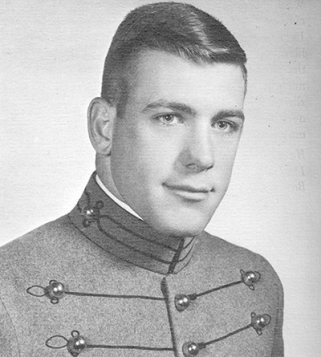
Mr. Thomas B. Dyer ’67
Throughout his adult life, commencing as a young Army officer, then as a successful business leader, Chairman of the West Point Fund Committee of the Association of Graduates, Chairman of the Board of Trustees of the Association of Graduates, USMA, and as a Civilian Aide to the Secretary of the Army, Tom Dyer has continuously and conspicuously demonstrated the principles of Duty, Honor, Country.
Read More
After graduating from West Point in June 1967 as a Cadet Captain, Tom Dyer was commissioned in the Field Artillery and completed the Field Artillery Officer Basic Course, Airborne School, and Ranger School (the honor graduate in his Ranger class). He then reported to the 2d Battalion, 14th Field Artillery, 4th Armored Division, where in 1969 he was Commanding Officer of B Battery, receiving the Army Commendation Medal. From 1969 to 1970, he served in the Republic of Vietnam on the MACV staff and as Aide-de-Camp to General Creighton Abrams, CINC of US Forces in Vietnam, receiving the Bronze Star Medal and Joint Services Commendation Medal. His final assignment before leaving active duty in 1971 was as Commanding Officer of the Detroit Induction Center, for which he received a second Joint Services Commendation Medal.
Following his active military service, he entered the world of business in the private sector. His move from the military to the civilian sector was an easy transition, since his leadership and managerial talents were quickly recognized. He was selected as a manager/leader by industry giant AT&T. He quickly rose through management ranks, serving at the end of his AT&T tenure as Division Manager for Northwestern Ohio, with responsibility for 1400 people and overall telephony.
He left AT&T in 1978 to become a partner in Techsonic Industries, a virtually unknown start-up company specializing in marine electronics, serving initially as Vice President of Marketing and Sales and then as President and CEO from 1988 until the company was sold in 1993. Through his leadership and business acumen, the company enjoyed a high-profit history and meteoric growth from annual gross revenues of less than $1 million to more than $100 million, while in the process becoming a major force in the fishing and boating market, with 97% name recognition. During this timeframe, he received several awards for most creative advertising and promotion of products in this niche industry, built a well-trained sales force to penetrate all channels of product distribution (domestic and international) and developed alliances with other companies worldwide to exploit the rapid distribution of early-stage technology at the consumer level. Additionally, he was the principal force behind the company becoming a “beta-site” for liquid crystal displays, “thin-film” technology, and environmentally-equipped electronic platforms.
Building off the impressive array of personal and professional skills he had honed through both his military service and his private business career, Tom made a conscious decision: he would turn his attention, and his impressive talents, to the matter of giving back to West Point – the place he credits in major degree for the achievements of his life, and an institution he holds in consummate regard and reverence. Elected to the AOG Board of Trustees in 1990, Tom rapidly proved to be an invaluable leader for the AOG, with service on several key committees, including Nominating, Strategic Planning, Distinguished Graduate, West Point Fund and the Executive Committee. In 1996, as the AOG was preparing to launch the first ever major capital campaign on behalf of the Military Academy, the $150 million Bicentennial Campaign, he assumed the Chairmanship of the West Point Fund Committee, with responsibility for planning and executing the campaign. It was a daunting task, and the results of his efforts have become legendary.
Tom Dyer was the indispensable driving force behind the Bicentennial Campaign. He conceived, structured, guided and led the AOG development team that made the Bicentennial Campaign an unprecedented success: exceeding its $150 million goal by $75 million. Beyond that Bicentennial Campaign itself, he led in raising another $100 million for West Point, and contributed in a major way, as well, to gain $300 million in additional funding for the Military Academy from the House Armed Services Committee. Without his unique, tireless and determined involvement, these monies would not have been raised; and without these monies, the Margin of Excellence transformation of West Point would not have been possible. As a result of the success of the Bicentennial Campaign and continued initiatives of Tom Dyer’s, the physical face of West Point has been significantly altered, with ten new, state-of-the-art, world-class athletic facilities, a new physical development center that is arguably the best in the Nation, and a new library worthy of a world-class Top Tier university. The academic and cadet leadership development pillars were also greatly enhanced under his direction, with the dedication of the Simon Center for the Professional Military Ethic, numerous endowed academic chairs and other academic program enhancements, and the funding and growth of the Counter Terrorism Center.
Elected as Chairman and CEO of the Association of Graduates in 2002, Tom Dyer was directly involved in every aspect of the 43,000 person Association of Graduates. He was personally involved in critical constituency relationships and throughout his tenure maintained close personal and professional ties with all who have served as Superintendent, Commandant, Dean, and Director of Athletics, not to mention countless others. He was responsible for restructuring the Association’s business operations and the Development Office, and was the person most responsible for reconfiguring the governing board to maintain compliance with Sarbanes/Oxley and New York State Law regarding non-profit organizations. Tom became a Chairman Emeritus of the AOG on 1 January 2006. In recognition of his countless contributions to and tireless service of the United States Military Academy during his tenure as Chairman of the West Point Fund Committee, Vice Chairman and then Chairman of the Association of Graduates, he was awarded both the Secretary of the Army Public Service Award and the Secretary of the Army Outstanding Civilian Citizen Award.
In 2003 Tom was selected by the Secretary of the Army to be the Civilian Aide for the Secretary of the Army for South Florida. In this capacity he continues to provide truly outstanding support to the Assistant Secretary of the Army (Installations and Environment) to enhance the quality of life for our soldiers and their families at U.S. Central Command, U.S. Special Operations Command, the Florida Ranger Camp, U.S. Army Recruiting Command, and U.S. Army Cadet Command.
Bold, forthright and proud, Tom Dyer is the epitome of a professional. He has proven his professionalism repeatedly in the 39 years since his graduation. As a soldier, businessman and in various capacities with the Association of Graduates, he has made all graduates proud to call him a West Pointer. He has given of himself beyond the call of duty, but more importantly he has inspired many others to give of themselves. Always positive, but never afraid to deal with different points of view, he has truly distinguished himself in his selfless service to West Point and others.
Accordingly, the Association of Graduates of the United States Military Academy takes great pride in presenting the 2006 Distinguished Graduate Award to Thomas B. Dyer.

